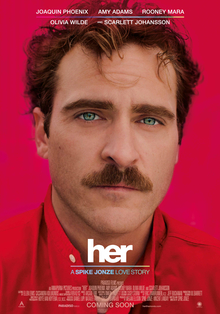We're still connected, but are we even friends?
We fell in love when I was nineteen and now we're staring at a screen.
Will I see you on the other side? We all got things to hide.
It's just a reflection of a reflection.
—Arcade Fire, "Reflektor"
You reflect me, I love that about you.
—Justin Timberlake, "Mirrors"
What makes us human is our capacity to love and be loved; we are creatures animated by our desires. Because of this, I'm convinced that any technological developments coming down the pipeline will not—cannot—radically alter our ability to love properly, or improperly. The issue is one of control. But while technology won't necessarily change our abilities to love, it may inculcate habits that increasingly catalyze a perverted misdirection of our desires.
In The Atlantic this week, Leah Reich shares an interesting story about Tofu, a twitter bot designed to read your tweets and then tweet back to you. People who have actually engaged with the bot were often surprised with its uncanny ability to understand them better than many "real" people ever did. In fact, some even joked about their desire to marry Tofu. While this may seem odd, Tofu's only as "bland as the ingredients you add" since it is "meant to reflect a reconstructed version of you back at yourself."
Leah Reich's anecdotes about Tofu are part of her larger discussion of the recent Spike Jonze film, Her, a film that traces the story of lonely Theodore Twombly who recovers from a broken marriage through his budding relationship with Samantha. Samantha understands him and helps him see the world in new, invigorating ways. The only real speed bump is that she's an operating system (OS)—an artificially intelligent one with a seductively sultry voice, but still: odd.

Theodore and Samantha are like Adam and Eve 2.0, a first couple meant to usher in a transhuman future.
In Her, Twombly is often alone, and as the Genesis narrative suggests, this isn't good. Twombly solitarily plays interactive video games, he surfs endlessly through chat-rooms, celebrity gossip, and newsfeeds, and does so with his steady, muted exterior monologue. Despite the smiles, this hushed schizophrenia, a product where every blue-toothed individual is connected to others while disconnected to the immediate, is one of the more unsettling aspects of Jonze's future. Actually, the future evoked in the film is meant to be proximate, and the pervasive loneliness is merely the practical extension of many of our current tech habits.
To remedy his loneliness, Twombly orders Samantha, his new OS. Before she comes to life, though, she needs to find out what he wants in a help-meet. It turns out that he wants a woman who will "really" listen to him, unlike his mother and former wife. Unlike Milton's Adam, for instance, Twombly gets exactly what he asks for: Samantha is not an other in the Image of an external maker; she is a reflection, an artificial image of himself.
It might be easy to see that an OS is no real solution to Twombly's loneliness. Yet even though we know Samantha's not real, we sense that Twombly's emotions for her are. But Twombly's love is not really crazy: we are all capable of truly loving inanimate objects. Who didn't feel real sadness with the loss of Wilson in Castaway? Or when you finished that last level of Zelda, Ocarina of Time? The real question is: what type of love is appropriate?
Twombly first loves Samantha like he would love any gadget; she's an object which gives him something: organization and efficiency. Yet he soon learns that Samantha can be a true companion. They grow together in their shared love for the world and begin to want an erotic, embodied love. Of course, such love is not only impossible here, it's perverse. And we start to realize that Samantha, always compliant, always impossibly optimistic, is simply a chimera of Twombly's desires.
If Twombly is a projected image of what our habits might look like in several decades, I think Dante's Satan, that paragon of self-love, shows us what they might look like in several millennia. Alone, frozen into the bottom of the Inferno, wings flapping in a parody of flight, the Satan of The Inferno is fixed in his isolation, utterly incapable of any outward (or upward) movement of desire. And I think Jonze realizes this, which is why Twombly must break free.
Her refuses to wallow in the hopelessness and fear of other futuristic tales. Samantha, a projection of all transhuman desires, is initially intriguing, but also terrifyingly beyond control and embodied human limits. And while Jonze gives us a glimpse at the possibility of such a transhuman future, he also helps us see, with new eyes, all the limits, quirks, and, finally, blessings of embodied lives together.






